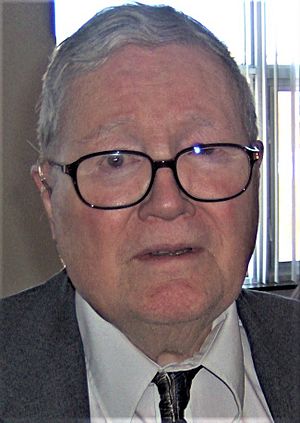Gordon Tullock facts for kids
Quick facts for kids
Gordon Tullock
|
|
|---|---|

Tullock in 2007
|
|
| Born | February 13, 1922 |
| Died | November 3, 2014 (aged 92) |
| Nationality | American |
| Institution | George Mason University |
| Field | Law and economics Public choice theory |
| School or tradition |
Public Choice school |
| Alma mater | University of Chicago |
| Influences | Henry Calvert Simons Duncan Black Ludwig von Mises |
| Contributions | Rent-seeking |
| Information at IDEAS / RePEc | |
Gordon Tullock (born February 13, 1922 – died November 3, 2014) was an American economist and a professor. He taught law and economics at George Mason University School of Law. He is famous for his work on something called public choice theory. This theory uses economic ideas to understand how political decisions are made. He was one of the main people who helped create this field of study.
Contents
Early Life and School
Gordon Tullock was born in Rockford, Illinois. He went to Rockford Central High School. After high school, he studied at the University of Chicago. He took a break to serve in the military during World War II. After the war, he earned a law degree in 1947.
He worked as a lawyer for a short time. Then, he joined the United States Foreign Service. This meant he worked for the U.S. government in other countries. He was sent to Tianjin, China. He also learned Chinese at Yale and Cornell universities. Later, he worked in Hong Kong and Korea. He left the Foreign Service in 1956.
Academic Career and Public Choice Theory
Gordon Tullock worked with another economist, James M. Buchanan. Together, they wrote an important book called The Calculus of Consent: Logical Foundations of Constitutional Democracy in 1962. This book became very important in the new field of public choice.
Even though Tullock had never taken economics classes, he and Buchanan ran an economics research program. They also started a new journal in 1966. It was first called Papers in Non-Market Economics. Later, it became Public Choice. This journal published articles that used economic ideas to study things outside of regular markets, especially in government and politics.
Developing Rent-Seeking Theory
In 1967, Tullock identified many ideas about what is now known as rent-seeking. This is a key concept in public choice theory.
Tullock moved to Virginia Tech in 1968. Buchanan joined him a year later. They continued their work on public choice there. Tullock was the editor of the Public Choice journal until 1990. At Virginia Tech, he wrote many important books and articles. These included Private Wants, Public Means (1970) and The Logic of the Law (1971).
In 1983, Tullock and his research center moved to George Mason University in Fairfax, Virginia. He taught at George Mason from 1983 to 1987. Then, he taught at the University of Arizona from 1987 to 1999. He published over 150 papers and 23 books. Some of his later books include Autocracy (1987) and Rent Seeking (1993). In 1999, he returned to George Mason. He retired from teaching in 2008.
Understanding Rent-Seeking
Tullock helped develop the idea of rent-seeking. In public choice theory, rent-seeking means trying to gain profits or benefits through political actions. This is different from earning profits by making better products or services in the market.
For example, a company or a group might try to influence politicians. They might lobby for new laws that help them, even if those laws are not good for everyone. This can lead to problems where politicians make decisions based on who is lobbying them, rather than what is most efficient or fair.
Tullock also thought about the Tullock paradox. This paradox asks why rent-seeking activities often cost so little, even though they can lead to big gains.
Tullock's Spike: A Thought Experiment
"Tullock's spike" is a famous idea from Gordon Tullock. It's a thought experiment, which means it's an idea to make you think, not a real plan. Tullock suggested that if governments truly wanted to reduce car accidents, they should put a sharp spike in the middle of every car's steering wheel.
His idea was that if drivers knew an accident would likely be fatal to them, they would drive much more carefully. This extreme idea was meant to show how people change their behavior based on risk. He believed it would actually lead to fewer accidents overall.
Awards and Recognition
Gordon Tullock received many honors for his work. In 1994, he was given an honorary Ph.D. from the University of Chicago. In 1998, he became a distinguished fellow of the American Economic Association.
He also served as president of several important economic groups. These included the Southern Economic Association and the Public Choice Society. In 1996, he was chosen for the American Political Science Review Hall of Fame. Many people thought he might even win the Nobel Memorial Prize in Economic Sciences.
Criticism
Some people have criticized Tullock's work. For example, his book The Politics of Bureaucracy was criticized for not looking at enough existing research. Other experts have also said that Tullock's public choice ideas might be too simple in explaining how people behave in politics.
Death
Gordon Tullock passed away on November 3, 2014, in Des Moines, Iowa, at the age of 92.
See also
 In Spanish: Gordon Tullock para niños
In Spanish: Gordon Tullock para niños
 | William L. Dawson |
 | W. E. B. Du Bois |
 | Harry Belafonte |

